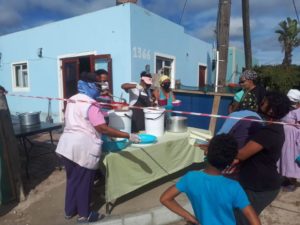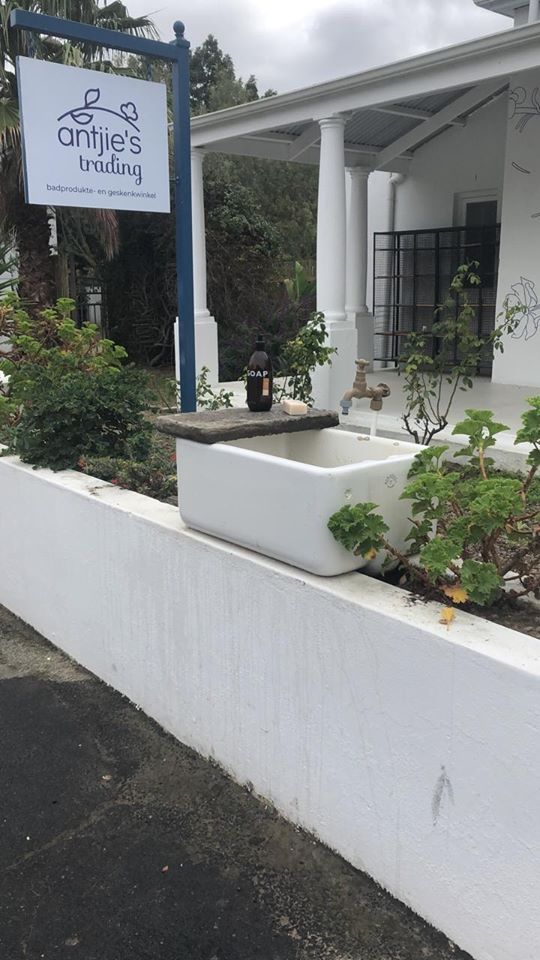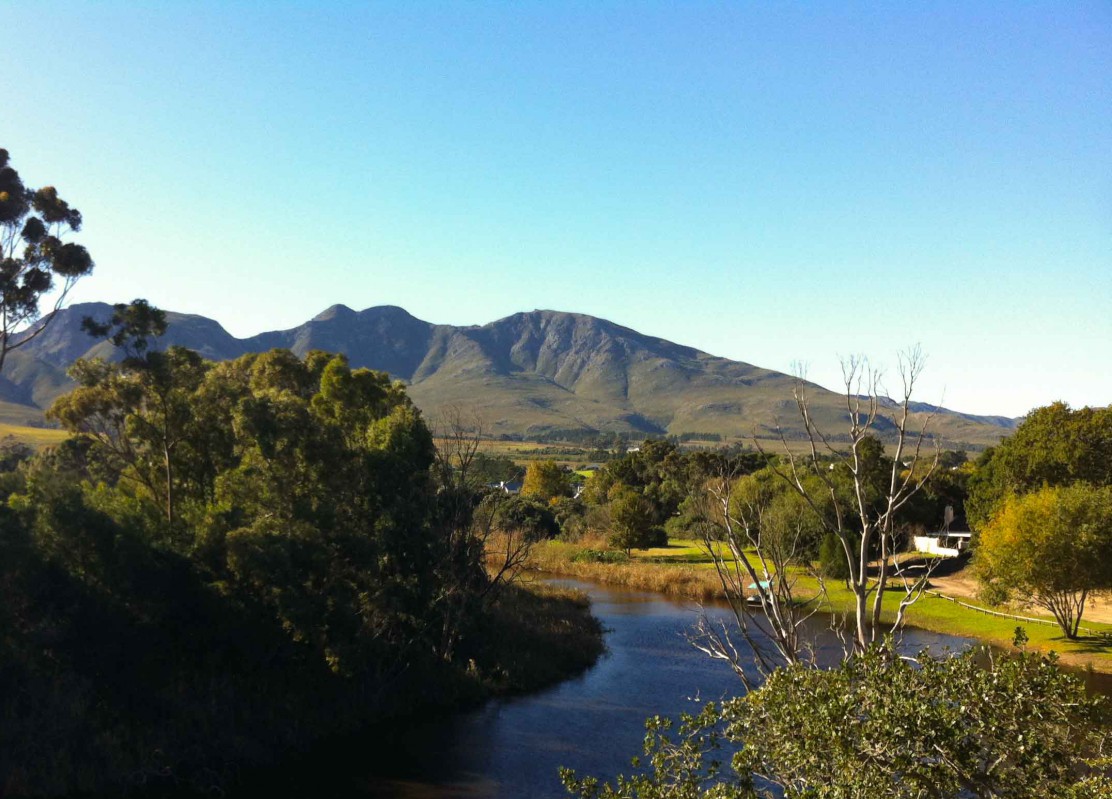Community support, selfless volunteering of time and effort, generous donations, simple consideration for the wellbeing of others and ingenuity. This is the thread that runs through Stanford Village. So this is what Stanford Village has been up too since the impact of COVID-19.
Stanford Village Foundation, Stanford Rotary and Food4Thought Food relief scheme
These three foundations have been working in collaboration from the outset of lockdown, 27 March 2020 to relieve the reality of food shortages in the Stanford South Community. Food parcels were originally compiled of staple food items from funds generously donated by private individuals and companies. These food parcels (design to feed a small family for a week) were distributed within the poorer community, in alliance with community leaders, in order to ensure fairness. 390 food parcels for example were distributed on 30 April, the last day of hard lockdown alleviating hunger for 1500+ individuals.
Since the commencement of Phase 4, the focus has shifted, concentrating on a ‘Food Bank’ supplementing the municipal food kitchens operating both from the Universals Rugby Club and the Stanford taxi rank. Funds donated have also been used to set up additional daily (7 days/week) food kitchens at Die Kop and Thembelishle (Blombos, Compacta and Melkhout streets).
The ‘Food Bank’ is an extension of the food procurement and storage system set up in the initial 21 day hard lockdown and continues to be coordinated by the Stanford Village Foundation. The Food Bank offers support to food kitchens managed through Food4Thought and Stanford Rotary as well as supplementing the Overstrand Municipality’s efforts in Stanford. The Stanford Village Foundation is assisting Food4Thought with stock control, negotiating food prices and the timely ordering of stock. This helps to ensure that this complex operation runs as smoothly as possible.
Donations have made this possible and heartfelt appreciation must go to every individual and organisation that have reached out. Without this generosity the far-reaching response to flatten the hunger curve would not be possible. The joint effort of the municipality, Rotary and Food4Thought means that at least 1 500 people are fed daily. The vegetable garden at Die Kop provides organic vegetables to the kitchens over and above those purchased with donations. These food kitchens, assisted by chefs from Springfontein Eats, are open to EVERYONE in the community, which also includes the foreigners living in Stanford.
“The support from the entire village since lockdown has been incredible. We cannot thank you enough.” – The Stanford Village Foundation.

Feeding Station
Antjies Handmade Naturals – Public Hand Wash Station
A public vintage porcelain hand washing basin together with a supply of hand soap was installed by Antjies Handmade Naturals in Queen Victoria Street, Stanford, for any passers-by who feel they might need a hand wash en-route. Complimenting the basin, a purpose plumbed tap was installed and sponsored by Plumbtec. Outside of all the lovely smelly soaps and luxury bathroom supplies, Antjies has turned their attention since the advent of COVID-19 to manufacturing and supplying household cleaning products, face masks and sanitisers (both liquid and gel formats).

Antjies and wash station on Queen Victoria Street, Stanford
Kiwinet
During these uncertain times, Kiwinet partnered with talented artist Liezl Franken, producing and distributing masks to help slow the spread of COVID 19 under the banner Do Good Feel Good.
The masks are made with 3 layers of fabric, a soft inner cotton layer and an identifiable outer layer to ensure one wears it the right way around! They are made by local seamstresses and tailors either at Kiwinet or at their own home – thereby providing an ongoing income to staff and community by extension. Kiwinet have donated hundreds of masks to the community to date and will continue to do so both within the Stanford and Gansbaai clinics as well as the many soup kitchens.
Donations are welcomed by Kiwinet as there are still many less fortunate people in the local community that require masks but who cannot afford them. Please contact Kiwinet directly – popup@kiwinet.co.za or Liezl – liezlfranken@gmail.com to order your mask or to help donate.
This is their story on Youtube.
Kiwinet have extended their production line to the public too, selling their masks Plain masks (retailing at R25.00) and Shweshwe masks (retailing at R50.00). They are available at the Kiwinet shop on Daneel Street, Stanford.
Fynbos Distillery
Just before lockdown, Stanford’s local distillery, The Jolly Rooster, turned their production line from white spirit distillation to hand sanitiser. Their bottled hand sanitisers are available at the OK Minimark, Daneel Street, Stanford, and refills can be obtained at Martin’s Deli on the R43, Stanford. Jolly good news for all locals and passers-by.

Hand Sanitiser
Some worthwhile local causes to get involved with or support with donations during this trying time:
Food Parcel Schemes in Stanford:
The Foundation is a Public Benefit Organisation (Non-profit Company) with the aim to facilitate and coordinate projects and programmes that will benefit the entire Stanford community and ensure overarching sustainability
Contact: 028 341 0430
Situated in the Overstrand area of the Western Cape, our small Club consists of 10 members and is active with Soup Kitchens, Swap Shops, Winter Warmth and Youth/Early Childhood Development Projects.
Contact: stanford@rotaryclub.org.za
Food 4 Thought Community Projects NPC, runs a successful
and well-loved Xhosa pre-school in Stanford, Western Cape, South Africa.
We are an early child development (ECD) school for children aged 3 to 6 years old.
Our language of tuition is IsiXhosa. We also encourage the use of English as a second language.
Our day starts at 7.00am and the children go home at 4.00pm.
We feed breakfast, lunch and snacks.
We provide safe transport to and from school.
We teach using a curriculum accredited by the South African government.
Contact: food4thoughtstanford@gmail.com
Creative Works aims to promote a nurturing, safe and stimulating environment for children and young adults to explore their creative potential
Contact: regina@creativeskillsfactory.co.za
Children’s Book Network (CBN) was founded by Gçina Mhlophe, Lesley Beake & Sindiwe Magona. Our purpose is to bring books to children and children to books.
Contact: info@childrensbook.co.za
SAWS aka Stanford Animal Welfare Society are a group of voluntary Stanford citizens that devote our time to save and help our unprivileged Stanford animals.
Contact: mailto:sawsstanford@gmail.com


